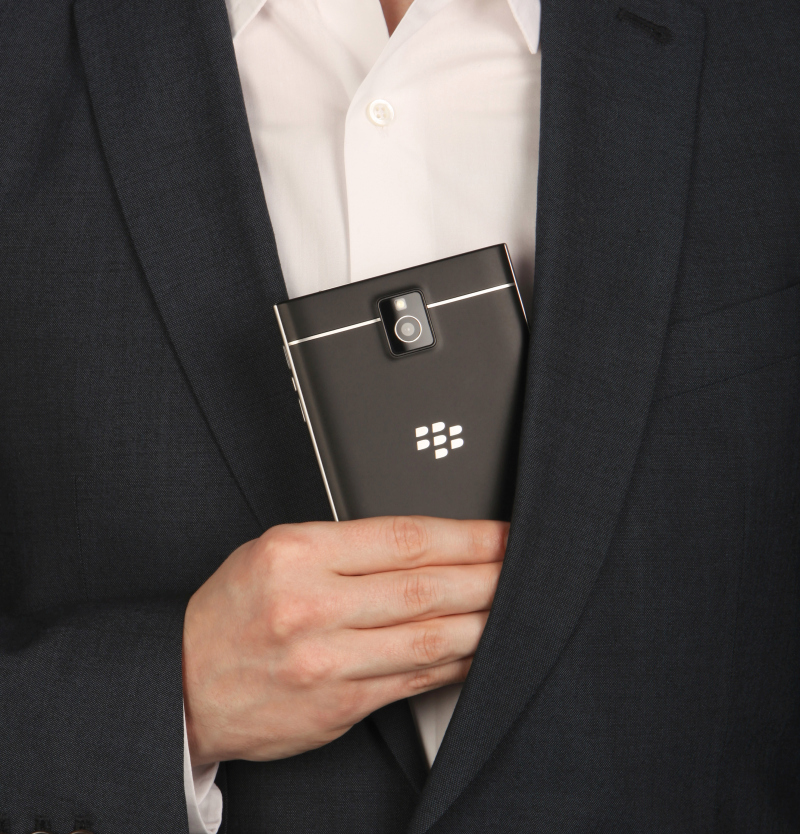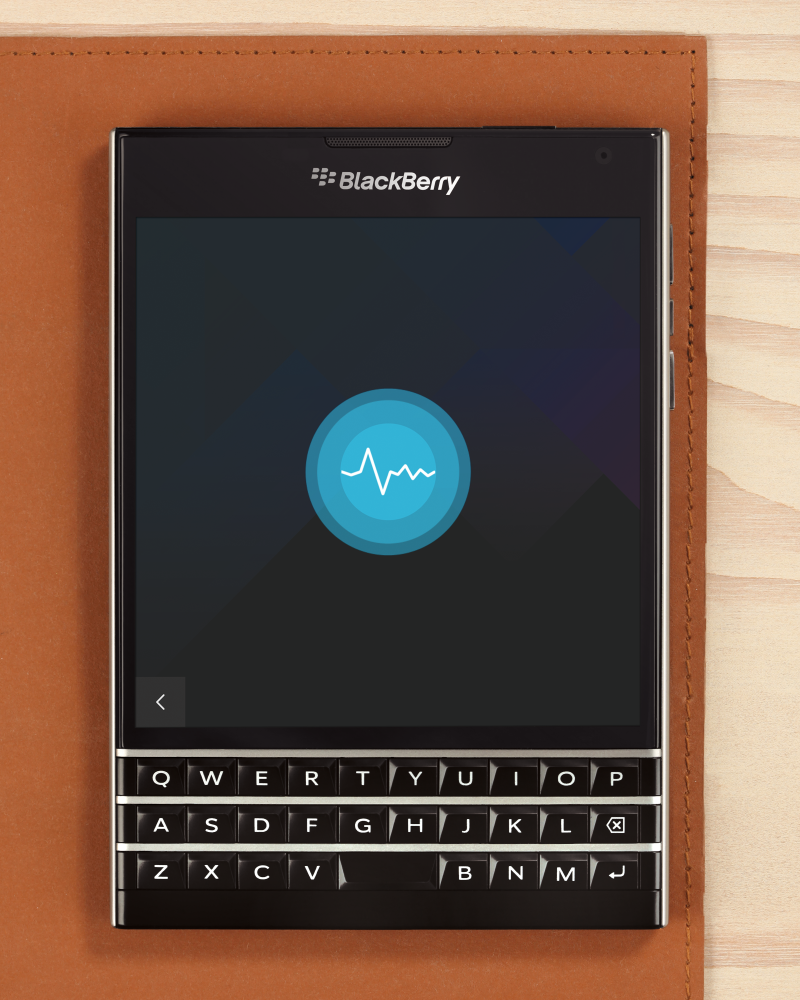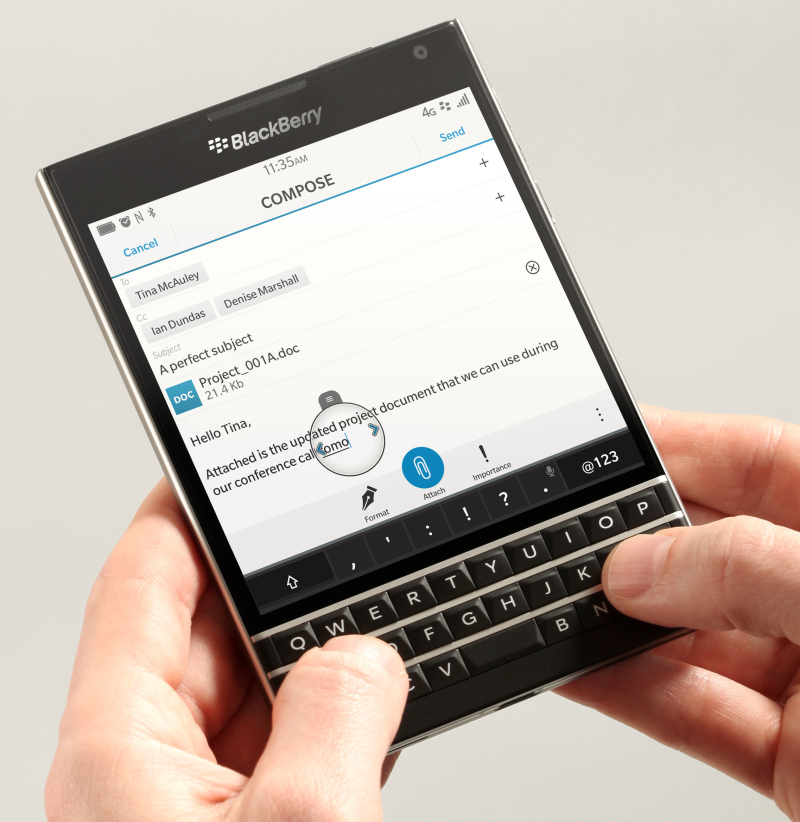BlackBerry Hopes Square Passport Smartphone Enough For Comeback
Today, BlackBerry launched its rumored, almost-square-shaped Passport smartphone seemingly targeted at professionals and people who want to "get things done." The question is whether it actually succeeds in reaching that goal.
The new BlackBerry Passport has a square 4.5" screen with 1440 x 1440 resolution, which means it's quite sharp at 452 PPI. It has a tough plastic body typical of BlackBerry phones, reinforced with a stainless steel frame and Gorilla Glass 3 screen protection, so it should be quite durable.
It comes with a Snapdragon 800 processor, which is relatively old by today's flagship standards. However, it has 3 GB of RAM, 32 GB of internal storage and a 13MP rear camera with OIS, which on paper are more competitive features.
The phone seems to have one of the largest batteries we've seen so far in smartphones, with a capacity of 3,450 mAh that should last for at least a full day of moderate to high usage (which should be expected from users who are focused on productivity).
The Passport runs BlackBerry 10.3, a revised version of the QNX-based BlackBerry OS we've seen for the past two years. It brings updated icons, a unified search bar, the BlackBerry Assistant (a competitor to Siri and Google Now) and the surprising addition of the Amazon Appstore.
It hasn't been easy for BlackBerry to promote itself as a solid alternative to the iOS and Android platforms when it has far fewer apps in its own BlackBerry World app store, but the Amazon Appstore should close the gap a little more and boost the Passport's appeal somewhat. BlackBerry's new CEO, John Chen, has mainly focused the company on mobile security and services that the company can offer even for competing platforms as its own customers adopt them and leave the BlackBerry platform. However, selling hardware can also bring significant revenue and profits to the company, if done right. With the BlackBerry Passport it looks like the company wanted to make a strong statement that it is still the company that focuses much more on its enterprise customers than any of its competitors.
It's not clear, however, whether the Passport is the right product to do that. Most people might find its almost square shape unappealing and strange. While the keyboard could be well built, it doesn't look like it's easy to use with one hand, which means even people who may prefer typing on a physical BlackBerry style keyboard may chafe at using it somewhat. Further, many smartphone owners have already gotten used to typing on touchscreen phones over the past few years, especially when swipe capabilities in some virtual keyboards can make one-hand typing even faster.
Get Tom's Hardware's best news and in-depth reviews, straight to your inbox.
If BlackBerry is to make a strong comeback in the mobile market, it will likely need a product that has a much bigger mainstream appeal. Focusing on the small remaining market of hardcore BlackBerry users with a product like the Passport is probably not the best way to do that, even if those users really love the product – which is still something that we won't know until the company announces its next quarterly results.
BlackBerry will be selling the product for $249 on contract on AT&T's network and $599 unlocked from BlackBerry's online store in the U.S., Canada, UK, France and Germany. The phone should be available in 30 countries by the end of the year. BlackBerry 10.3 will also be coming to all BlackBerry 10 devices.
Follow us @tomshardware, on Facebook and on Google+.
Lucian Armasu is a Contributing Writer for Tom's Hardware US. He covers software news and the issues surrounding privacy and security.
-
gamebrigada From WSJReply
"The square screen is the same size as a piece of American cheese. "
http://si.wsj.net/public/resources/images/BN-ER441_STERN0_M_20140923181621.jpg
Is that the new bunny with a pancake on its head? Or does it include cheese digitizing for later consumption? -
tom10167 I love the idea of a serious phone for serious business people. Hope it works out for them.Reply -
jedik1 WOW a company promoting security uses Amazon App Store where 90% of the apps are fake, fraud and malicious. Good Judgement. Way to go to spread malware and fakeware.Reply
Anyways what can you expect from BlackBerry who are like 10 years behind.
At $599...this is a joke. I will happily buy a One Plus One for $359 and add every security feature from Playstore. -
Dorosh I think the person who wrote this article is jealous because they probably own a POS iPhone 6 with only a dual core 1.4 GHz processor.Reply
"Relevantly old hardware" he says? I think that fact is useless considering it's a quad core 2.26 GHz processor - still much faster than most cell phones and blows away the iPhones... Not to mention 3GB of RAM which is a plus for multi-tasking and being able to leave apps running in the background for added speed. I hope they do well and I want to buy one. -
amk-aka-Phantom ReplyI think the person who wrote this article is jealous because they probably own a POS iPhone 6 with only a dual core 1.4 GHz processor.
"Relevantly old hardware" he says? I think that fact is useless considering it's a quad core 2.26 GHz processor - still much faster than most cell phones and blows away the iPhones... Not to mention 3GB of RAM which is a plus for multi-tasking and being able to leave apps running in the background for added speed. I hope they do well and I want to buy one.
As an avid Android user: GARBAGE. Have you seen benchmarks of Apple SoCs? Do you understand that you can only compare CPUs by clock and cores if they are using the same architecture? According to your logic, today's Pentium G620 loses out to an old Pentium 4 HT because the latter runs 400 MHz faster. (Newsflash: it doesn't, because G620 is built on far superior arch.) As for RAM, blame Android's RAM-hungry Java. I personally don't mind it - I like Android a lot more than iOS and don't mind getting a device with 2-3 GB RAM (although unless your firmware is some Samsung TouchWiz bloated rubbish, 1 GB is enough, ask Motorola Moto G) at same or lower price to get similar multi-tasking, but I assure you, 1 GB is enough for iOS. It's optimized, the same way my Ubuntu 14.04 is happy with 2 GB RAM max usage while Windows 7 goes "ho ho ho, look at that 8 GB, let me eat up 3 of that just for having Firefox and file explorer open!" If you don't know what you are talking about, do not post. Simple.
As for the new Blackberry: unfortunately, the author is right. Why buy it? "Security" is already sold out to governments who demanded access for it, hardware and features are inferior to iPhones and Android flagships, price is high. It's kind of sad, but this is probably going to be the last Blackberry phone. I never liked them (too many "security" gimmicks and marketing) but when a company dies, it's always sad to watch. -
edivalentin the fact that uses latest cpu/gpu from qualcomm isn't enough?and has 3GB RAM on an OS that is not as RAM hungry as Android isn't enough? and runs Android apps if you wish to install on it? in security terms is the only mobile os that is certified by the military/government use.i am sure BB brand will not die soon, at least as an software company...Reply -
MarkFrom NZ I jut bought my first blackberry, a q10, and its a best phone I've ever owned..Android is a very badly desinged OS its cumbersome...if more people knew how great Balckberry was it would be far more popular than Android phones...the only thing that has made Android phones popular is cheap Chinese samsung rip offs....Reply


